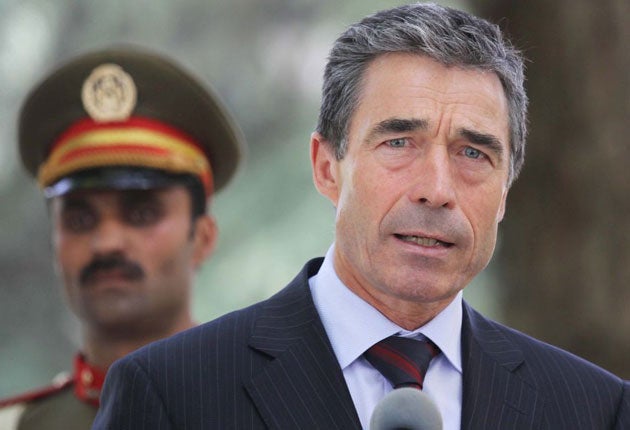Your support helps us to tell the story
From reproductive rights to climate change to Big Tech, The Independent is on the ground when the story is developing. Whether it's investigating the financials of Elon Musk's pro-Trump PAC or producing our latest documentary, 'The A Word', which shines a light on the American women fighting for reproductive rights, we know how important it is to parse out the facts from the messaging.
At such a critical moment in US history, we need reporters on the ground. Your donation allows us to keep sending journalists to speak to both sides of the story.
The Independent is trusted by Americans across the entire political spectrum. And unlike many other quality news outlets, we choose not to lock Americans out of our reporting and analysis with paywalls. We believe quality journalism should be available to everyone, paid for by those who can afford it.
Your support makes all the difference.Nato hailed Serbia's arrest of indicted war criminal Ratko Mladic today, saying he was implicated in some of the worst massacres in modern European history.
"Almost 16 years since his indictment for genocide and other war crimes, his arrest finally offers a chance for justice to be done," Nato Secretary-General Anders Fogh Rasmussen said.
"General Mladic played a key role in some of the darkest episodes of Balkan and European history, including the siege of Sarajevo and the massacre of thousands of Bosnian men and boys in Srebrenica in 1995," he said in a statement.
About 100,000 people died in the 1992-95 war between Bosnia's three ethnic communities.
Nearly 60,000 Nato troops, including more than 20,000 Americans, were deployed to there after the 1995 Dayton peace agreement to enforce the U.S.-sponsored accord which ended the war. They have since been withdrawn and replaced by a much smaller European Union force.
The Nato deployment, which immediately stopped the fighting, provided a much-needed boost for the alliance at a time when many were questioning its continued relevance in the post-Cold War world.
But Nato troops were criticised for allegedly not going after top war crimes suspects such as Mladic and former Bosnian Serb leader Radovan Karadzic — who is currently standing trial in The Hague.
And President Bill Clinton — who ordered the deployment — was attacked by Republican critics who accused him of lying to Congress about the mission's duration and of trapping the United States in the Balkan crisis.
In 1999, Nato warplanes bombed Serbia for two-and-a-half months to end a crackdown by Slobodan Milosevic's troops against the Albanian minority in Kosovo province.
Kosovo has since declared independence from Serbia. Nato still retains a small residual military presence there.
"Nato has been a guarantor of security in the Balkans for the best part of two decades and today we have seen an important step towards a Europe that is whole, free and at peace," Fogh Rasmussen said. "We remain committed to assisting the whole region."
Reaction to Mladic's arrest
- "Today also underscores, however, that justice will come to those who carry out these types of crimes against humanity, that the international community will be unrelenting in the pursuit of that justice and we certainly congratulate the Serbian government." — US Deputy National Security Adviser Ben Rhodes, accompanying President Barack Obama at the G8 in Deauville, France.
- "These victims have endured unimaginable horrors — including the genocide in Srebrenica — and redress for their suffering is long overdue. ... We believe that it can have a positive impact on reconciliation in the region." — Serge Brammertz, chief prosecutor of the Yugoslav war crimes tribunal, in a statement.
- "The European perspective for Serbia is brighter than it has been before. A very important condition that we've had is that they cooperate fully with the war crimes tribunal in The Hague. The arrest of first Karadzic and now Mladic show that they are complying with this demand." Carl Bildt, Swedish foreign minister and former peace negotiator for Bosnia, by telephone to the AP.
- "His arrest is a clear message to accused like Omar al-Bashir and potential accused like Moammar Gadhafi that justice never forgets." — Richard Dicker, director of Human Rights Watch's International Justice Program, in an email to the AP.
- "In the end people get chased, prosecuted and finally get put away. And justice will triumph. And again, in that sense, this is a special moment for very many people." Prime Minister Mark Rutte of the Netherlands, whose U.N. battalion was overrun by Mladic's troops at Srebrenica in 1995.
- "It's a very courageous decision of the Serbian president. It is a step toward integration of Serbia into the European Union someday soon." — French President Nicolas Sarkozy, speaking at the G8 summit in Deauville.
- "Nato has been a guarantor of security in the Balkans for the best part of two decades and today we have seen an important step toward a Europe that is whole, free and at peace. ... We remain committed to assisting the whole region." Nato Secretary-General Anders Fogh Rasmussen, in a statement.
- "With the Tribunal nearing completion of its cases, domestic courts in the region must also remember their responsibility to prosecute war crimes suspects. These authorities must do much more to ensure that all victims of the horrific crimes committed by all sides to the conflict have access to justice." — Sian Jones, Amnesty International's Serbia researcher.
- "Good news from Belgrade. Looks like Mladic has been arrested. Helps Serbia's path towards the EU." — Finland's Foreign Minister Alexander Stubb, on Twitter.
- "It's a test of the great democratic maturity of Serbia, which gets closer to Europe and the European Union, a process that Italy has strongly encouraged, and it's now necessary to speed up (that process) without reservation." — Italian Foreign Minister Franco Frattini in a statement.

Join our commenting forum
Join thought-provoking conversations, follow other Independent readers and see their replies
Comments